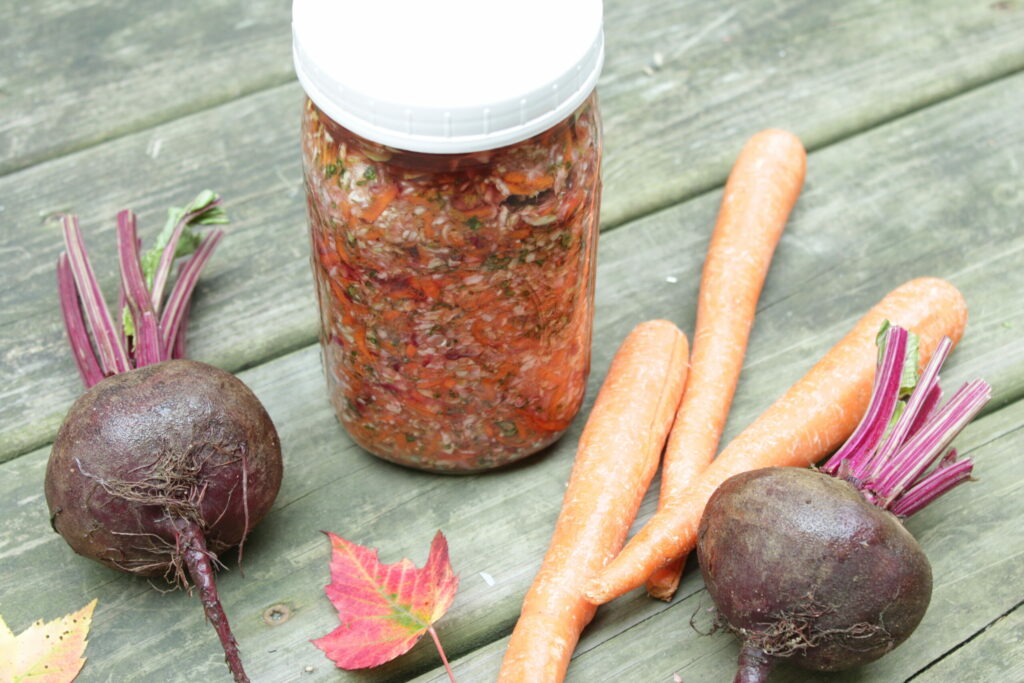The holidays are a wonderful time of year. The holiday season is filled with celebrations, parties, feasts, gift-giving, gift-receiving, and maybe some travel, in-laws, visitors, and more. I love the holiday season and look forward to it every year.
By the time Halloween rolls around though, I remember the other stuff (the stuff I really don’t look forward to) and a desire to stay healthy throughout the holidays becomes top of mind for me. All that joy and merriment is often accompanied by more stress, less sleep, more sugar, more alcohol, and to top it all off. . . cold and flu season.
Recently, I taught a class on how to stay healthy throughout the holidays at our local Co+Op. The class was a lot of fun and the participants loved the simplicity of the message. I want to share the 3 simple strategies I shared in the class with you, so you too can lean into the joy of the holidays and stay healthy throughout the holidays too.
Healthy Holiday Strategy #1: Balance your blood sugar
Keeping your blood sugar stable is important all year round, but it’s especially important when stress rises and there’s holiday cookies, cake, candy, and punch at every gathering. Stress increases cortisol which signals your body to crave sugar and store fat.
When you eat carbohydrates (foods made up of sugars and starches) the sugars from the meal get absorbed through your GI tract and enter your bloodstream. Your blood sugar rises and your pancreas releases the hormone insulin. Insulin allows your cells to pull sugar from your blood to use as fuel, which lowers your blood sugar. Eating too many carbohydrates at meals not only spikes blood glucose and insulin, it negatively affects inflammation and your immune system (which is your main defense against colds, flu, and other illness going around). Your energy and mood are also affected by blood sugar swings.
So, what can you do? Reduce the amount of sugar and processed food you eat AND dampen the effect of carbohydrates on your blood sugar by slowing down their absorption. You can do this by eating healthy fat, fiber, and protein-rich foods at meals and snacks. Healthy fats include avocado, nuts, seeds, nut butters, extra virgin olive oil, and others. Protein-rich foods include fish, shellfish, grass-fed meats, poultry, eggs, cottage cheese, Greek yogurt, lentils, legumes, and others. High fiber foods include legumes, whole grains, vegetables, fruit, nuts, and seeds.
For meal and snack ideas and more strategies on how to balance blood sugar with fat, fiber, and protein, read this: Stabilize your blood sugar
Take action: Include foods rich in healthy fat, fiber, and protein at every meal and snack.
Healthy Holiday Strategy #2: Support your gut
Did you know that 70-80% of your immune system lives in your gut? There is a complex relationship between the food you eat, the gut microbiome, and your immune system. Eating too much sugar, consuming alcohol, and chronic stress all negatively affect gut health and the make-up of your microbiota.
So, what can you do to support your gut? Incorporate fermented foods in your diet whenever you can. Slowly work up to about 1 tablespoon of fermented foods with each major meal. More or less may be the sweet spot for you, try experimenting! Examples of fermented foods include yogurt, kefir, sauerkraut, kimchi, other fermented vegetables like pickles, carrots, and others, tempeh, miso, and more. If you want to incorporate beverages like kombucha, small amounts are often supportive (think shot glass vs. the whole bottle). More on fermented foods here: 3 important reasons to eat fermented foods and where to find them

If you don’t tolerate fermented foods or you want specific support for your gut, probiotics and prebiotics are great additions to support gut health. Learn more about these here: Prebiotics, Probiotics, and Postbiotics
Vegetable broths, mushroom broths, and bone-broths are also helpful for gut health. Bone broths are rich in l-glutamine which helps repair and rebuild the intestinal barrier. Making broth-based soups and stews or using broth as the cooking liquid for whole grains are easy ways to incorporate broths into your diet. Adding plenty of fiber-rich vegetables, legumes, and/or whole grains to soups is extremely supportive for gut health (in most situations, not all).
Take action: Choose 1 way to support your gut this holiday season. Will you add in fermented foods or a probiotic, prebiotic, or synbiotic? Will you incorporate nutrient rich broths to make soups and stews?
Healthy Holiday Strategy #3: Double down on healthy habits
As the weather gets chilly and the seasons shift, you may find your habits need a refresh and re-commitment.
Do you have any lifestyle habits that have shifted or fallen away in a less supportive way? Here are some lifestyle habits to think about:
- Physical activity: Are you moving your body each day? Are you doing something to strengthen your muscles each week?
- Sleep: How’s your sleep? What could you do to improve your sleep hygiene?
- Stress management: How are you managing stress? Could you recommit to deep breathing, meditation, or a gratitude practice?
- Fun and relaxation: What are you doing regularly for relaxation and fun? Is it supporting your health and your goals?
- Supplements: Are you taking the ones you know you need to take consistently?
- Meals/snacks: Are you eating late at night or eating when you’re not hungry?
- Hydration: Are you drinking enough water? Could you add in some herbal tea to support health, calm, and hydration?

Don’t tackle these all at once! They are all important, but just choose 1 to refocus on.


Thank you 😊
My pleasure Sue!